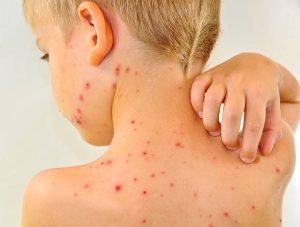Understanding Chickenpox: Causes, Symptoms, Prevention, and Treatment
What is Chickenpox?
Chickenpox, medically known as varicella, is a common viral infection primarily affecting children but can occur at any age. It is caused by the varicella-zoster virus and is highly contagious.
Chickenpox is most prevalent during the winter and spring months, particularly from March to May. It primarily affects children under the age of 10 but can cause more severe complications in adults.
Causes and Transmission of Chickenpox
The varicella-zoster virus is responsible for causing chickenpox. It spreads quickly through direct contact with an infected person’s blisters, or through droplets released into the air by coughing or sneezing.
High-Risk Groups
Certain people are more susceptible to severe chickenpox, including:
- Pregnant women
- Newborns and very young children
- Individuals with weakened immune systems (e.g., those undergoing cancer treatment or taking immunosuppressive medications)
Symptoms of Chickenpox
Chickenpox usually begins with mild flu-like symptoms before the rash appears. Early symptoms may include:
- Feeling unwell
- High temperature (fever) over 38°C (100.4°F)
- Headache
- Loss of appetite
- Aching muscles
The Chickenpox Rash
The most recognizable symptom of chickenpox is a red, itchy rash that progresses through three stages:
- Red Spots – These often appear behind the ears, on the face, scalp, chest, belly, arms, and legs but can occur anywhere, including inside the mouth and on the palms and soles.
- Blisters – Within hours, these spots develop into fluid-filled blisters that become very itchy.
- Scabs – After a few days, the blisters dry out, crust over, and form scabs, which fall off within 1 to 2 weeks.
The rash typically appears in clusters, with new spots forming over 3 to 5 days, meaning that different groups of spots can be at varying stages of blistering or scabbing.

When to Contact a Healthcare Professional
Most cases of chickenpox are mild and self-limiting, but you should contact a GP if:
- The skin around the blisters becomes red, hot, and painful.
- You or your child experience chest pain, difficulty breathing, or dehydration.
- Blisters become infected or symptoms suddenly worsen.
- You are pregnant, have a weakened immune system, or your baby is under four weeks old and you have been exposed to chickenpox.
Important: Notify your GP practice if you suspect chickenpox before attending an appointment to avoid spreading the virus.
Managing Chickenpox Symptoms at Home
Although there is no cure for chickenpox, the following measures can help ease symptoms:
- Fever Relief: Use paracetamol (avoid ibuprofen unless advised by a doctor).
- Soothing Itching: Calamine lotion, cooling gels, and lukewarm baths with baking soda or colloidal oatmeal can help relieve itching.
- Avoid Scratching: Keep nails short to reduce the risk of infection from scratching.
Preventing the Spread of Chickenpox
To minimize the spread of chickenpox:
- Keep children at home until all spots have crusted over.
- Avoid public areas and contact with high-risk individuals, such as newborns, pregnant women, and immunocompromised individuals.
Chickenpox Complications
Complications are more common in adults, pregnant women, newborns, and those with weakened immune systems. Complications may include:
- Infection of the blisters
- Pneumonia
- Brain inflammation (encephalitis)
- Foetal varicella syndrome (FVS) in pregnant women, which can lead to birth defects such as scarring, eye problems, and limb defects.
Chickenpox During Pregnancy
Pregnant women who contract chickenpox are at a higher risk of complications, including pneumonia and foetal varicella syndrome (FVS). If you are pregnant and suspect exposure to chickenpox, contact your GP immediately.
Chickenpox and Shingles Connection
After recovery from chickenpox, the varicella-zoster virus remains dormant in the body and may reactivate later in life as shingles. It is possible to contract chickenpox from someone with shingles, but not the reverse.
Vaccination Against Chickenpox
A chickenpox vaccine is available but is not part of the routine childhood vaccination schedule. It is offered to individuals who are at higher risk of severe complications. Vaccinated individuals can still contract chickenpox but are more likely to experience milder symptoms.







